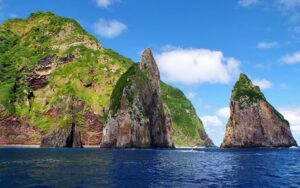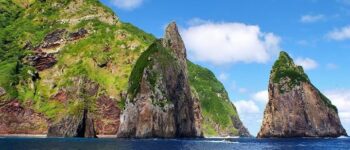1863: New Zealand and the Pacific Slave Trade
June 18, 2021
By AHNZ
 In the first week of June, 1863, New Zealand was involved in the Pacific Slave Trade according to Radio New Zealand’s advertisement for The Stolen Island: Searching for ‘Ata. It’s a bold claim from the 2016 book and author Scott Hamilton. For those with a ready affinity for White Guilt about colonial New Zealand no further explaination is required but for the rest of us let’s listen to what he has to say…
In the first week of June, 1863, New Zealand was involved in the Pacific Slave Trade according to Radio New Zealand’s advertisement for The Stolen Island: Searching for ‘Ata. It’s a bold claim from the 2016 book and author Scott Hamilton. For those with a ready affinity for White Guilt about colonial New Zealand no further explaination is required but for the rest of us let’s listen to what he has to say…
New Zealand’s role in the Pacific slave trade appears to consist of very little based on what Hamilton has to say in his RNZ interview. If he were correct then that would, indeed, be quite a shock for the 1860s because that wasn’t really so long ago and our country was very much up and running by then. So what did happen?
In brief, one Tasmanian captain, James McGrath, recruited a bunch of Maoris with a history of holding slaves in the Chathams. And, when these New Zealanders find out the Tasmanian has slavery in mind they refuse! Indeed, they demand to be let off the ship, the Grecian, for the nearest island.
The Māori had come aboard at the Chathams, and were probably members of Ngāti Mutunga or Ngāti Tama, the two north Taranaki iwi that invaded the Chathams in 1835, killed many of the islands’ indigenous Moriori people and enslaved the survivors.
By the time it reached the coast of ‘Ata, the Grecian had been gone for 18 months, and now had a crew of 16, only a handful of whom had left Hobart with McGrath. Most had been recruited a few weeks earlier in the Chatham Islands.
The New Zealand crew, most or all recruited from the Chathams, “condemned the idea. They would not enter the slave trade, and they demanded to leave the Grecian.” – Scott Hamilton: A slave raid in the Pacific, Etangata (2016)
Hardly an indictment to justify a “dark piece of our history” “often overlooked” called “New Zealand’s role in the slave trade.” But, you don’t need much evidence if you’ve got government radio doing the interviewing and especially not during the Millennial Victimhood Culture era that was finding its stride from 2016 onward.
“New Zealand’s role in the Pacific slave trade is “a dark piece of our history” that is often overlooked, Pacific researcher Scott Hamilton says….“We think of ourselves as the good guys and it’s the Australians and the Americans that had slavery,…And it’s a dark piece of our history.” – New Zealand and the Pacific slave trade, RNZ
“When he announced his decision to his crew a group of them rebelled and demanded to be dumped on the nearest island. And we have some testimony from those people which is one of the main sources for re-creating what happened.”- RNZ interview, c6mins
Those who did remain on the Grecian to raid the Tongan island, ‘Ata, may or may not have been New Zealanders. The ones who refused to enslave their fellows, were. Rather than celebrate the humanity of Taranaki-Chatham Islanders who had put their slaving ways behind them the author is hell-bent on dwelling on whatever can implicate White New Zealand. Yet the captain, McGrath, was a second generation Irish criminal from Tasmania not one of us. The 16 remaining crew who stuck by McGrath we don’t know enough about to make an Identitarian political fuss about which is a shame for the contemporary audience who wishes to make everything about race. Hamilton says in the interview that the bad men may have been ‘Portugese, Pakeha, and Maori, as far as we know.’
If the word of the defecting crewman is to be believed Captain McGrath was a very bad man, a slaver. What Hamilton does not explore is the possibility that these were unreliable witnesses. Chatham Islanders who prefer to be castaways in the middle of the Pacific than go on with their captain might not be entirely unbiased. That sort of thinking would get in the way of the author’s book and the line of publicity being run. If New Zealand slavery were really the topic of interest it would be very easy to find in Maori history but, of course, there’s to be no mention of that!
 Like Comment Share
Like Comment Share





